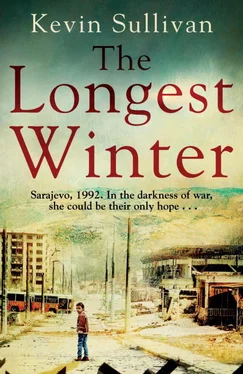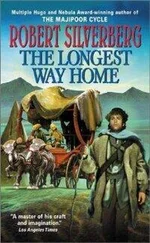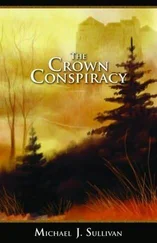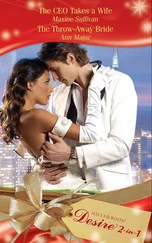‘Please call me Dario,’ Jurić said when they met in the lobby of the Holiday Inn.
They walked across the lobby and climbed to the first floor. Jurić made no attempt at small talk as they walked. In the restaurant they sat at the corner of a small table with a dirty cloth.
‘Room number?’ the waiter demanded.
Terry gave him the number.
He spoke to Jurić.
‘He wanted to know if I’m staying for dinner,’ Jurić translated.
Terry turned to tell the waiter that Jurić was her guest, but the man was already walking towards the kitchen.
‘It’s OK,’ Jurić said. ‘I explained to him that you are treating me!’
There was an awkward pause and then Terry said, ‘I’d like to see Miro tonight.’
Jurić smiled patiently. ‘That’s not possible. We may go tomorrow if there is less fighting.’ He waited to see her reaction. She looked at him steadily and he was prompted to continue. ‘We couldn’t possibly get into Otes tonight.’
‘The fighting’s serious?’
‘The Rebels may already have taken control.’
‘That would affect the evacuation?’
Jurić had removed a foot from a little girl and an arm from an eighty-four-year-old man that day – both victims of shelling. Terry’s question struck him as obtuse.
‘You see,’ he said, trying, not very hard, to speak in a mild, unoffended tone, ‘if the Rebels take the settlement tonight, Miro may be dead by the morning.’
The waiter brought soup, a watery consommé with some strands of spaghetti at the bottom. Jurić began to eat.
‘Is the district likely to be captured?’ Terry persisted. She wasn’t here to make friends with Jurić but she did need to cooperate with him.
Between mouthfuls, he responded, ‘We’ve been under siege for half a year, doctor. No running water. No electricity. I operate by candlelight. People are dying of cold. There’s malnutrition. We’re grateful you have come to help us. We admire your courage. Our city is no place for the faint-hearted. But Miro is simply another victim. Otes may be captured and so we may witness one more disaster. Or perhaps our army will hold the settlement. There are many variables.’
Then, more gently, ‘I’ll collect you in the morning. I can’t say what time. I’d be grateful if you’d wait in your room. Probably mid-morning. That OK?’
‘Yes, of course,’ she said. ‘I’m sorry. I’m still getting used to things.’
‘I can only tell you that, as far as I know, Miro’s condition is stable. His mother sent this to my colleague. It finishes the day before yesterday.’
Jurić reached into the inside pocket of his jacket and took out two sheets of folded A4 paper, handing them to Terry. Each sheet had three columns at the top of which was written, in a neat and educated hand and in English, temperature , hours of sleep and muscle relaxant , the last unspecified. Down one side were dates, hours and dosages, the numerals traced in the same elegant hand.
‘I’m afraid that’s all the documentation I can give you,’ Jurić said. ‘Any records we may have had at the hospital have been destroyed or lost. Miro’s mother may have more.’
Terry looked through the list. Without knowing what the medication was, the third column was of little use, though she noted that the dosage had been increased twice during the last ten days, suggesting a crisis. Miro’s temperature appeared to fluctuate significantly, which might be a problem when it came to moving him. Hours of sleep seemed to Terry little more than a desperate measure by the mother to record any information that might have a bearing on her child’s health. Terry couldn’t see that it was of any use. She struggled to absorb the fact that two pieces of A4 paper represented the full extent of case documentation ahead of major surgery.
‘Which is your field?’ Jurić asked. ‘Cardiology or paediatrics, or both?’
Terry was startled. ‘I’m not a specialist.’
He glanced up from his soup. Terry was beyond trying to assess the meaning of the look he gave her but instinctively she braced herself for a barbed comment.
Miro Pejanović had a form of cardiomyopathy at a stage where a transplant was the only treatment that might save his life. He was eight years old. It didn’t surprise Terry that Miro’s mother had an educated hand. She must have been very determined to get her child’s name onto a case list that was matched against international donors. She had done that a year earlier, and a donor had become available only after the city was placed under siege.
‘I’ve done a good deal of post-operative care,’ Terry said. ‘They needed someone to supervise Miro’s transfer and I was available.’
Jurić had finished his soup. He sat back and looked at her, raising his eyebrows.
The main course consisted of roast beef, potatoes and carrots. Jurić cheered up when this was served. ‘Life’s not bad in the Holiday Inn!’
He ate with relish, apparently oblivious to the explosions outside, and he took only the faintest interest in the journalists who began trickling into the dining room.
‘Did you visit this part of the world before?’ he asked.
‘I was at the coast twice, in the 1980s, on holiday.’
Until today she’d thought of those excursions as a useful introduction to this mission.
‘It’s beautiful there,’ Jurić said. ‘The beaches!’ Then he added, ‘You should have been here , though, when we lived together, peacefully.’
He took a mouthful of roast beef and potato.
‘Are you married?’ he asked unexpectedly.
‘As a matter of fact, no. Are you married?’
‘Yes, with two children. Two boys. My wife is with them, on the coast. I sent them away in March. I knew what was coming. Some of my colleagues are less fortunate. Their families are still here. My wife is working now. She’s a mathematician.’
‘Your English is very good.’
‘I travelled all over when I was a youngster. Africa, Asia. I spent a year in the States, in Boston.’
‘You speak other languages?’
‘German, a little Russian and Italian. Last year I began studying Japanese for my own amusement.’
‘You live near the hospital?’
‘Our old home was in Grbavica. The Rebels are there now. I live in an apartment near the presidency.’
‘Hello again!’ Terry and Jurić looked up. Michael Baring was standing over them.
‘Sampling more of the Holiday Inn fare?’ Baring asked Terry. ‘I don’t believe we’ve met,’ he continued, extending his hand to Jurić. Jurić stood up and shook hands.
‘May I join you?’ Baring sat down. ‘I’ve just come from Lukavica. Spent two hours with one of the commanders there, fascinating man. Really has all sorts of interesting things to say.’ Baring paused and then asked Jurić, ‘Are you a journalist?’
‘A doctor.’
‘From here?’ He sounded sceptical.
‘The State Hospital.’
‘I know your boss pretty well.’ Baring named a director at the hospital.
Jurić said nothing so Baring turned his attention to Terry. ‘Been out and about?’
‘It’s worse than I’d imagined.’
‘I don’t think anyone has a really clear picture until they’ve been here.’
The waiter arrived. ‘My good fellow,’ Baring said. ‘May I have a bottle from my stash?’
He turned to the other two and said, ‘I’ll have to eat quickly. I hope you’ll help me with the wine. I have a big story to write.’
The waiter brought soup. Baring addressed Jurić. ‘How’s the antibiotics situation? I understand you’re running out.’
‘It’s critical,’ Jurić acknowledged.
Читать дальше












